The Works of the Most Reverend Father in God, John Bramhall (5 vols.)
Digital Logos Edition
This product has been transferred from Community Pricing to Pre-Pub. The actual funding level may be lower than it appears, which could delay production. The amount of funding still needed will be evaluated and updated soon.
Overview
Archbishop John Bramhall was a Royalist and ardent supporter of the Church during the seventeenth-century English Civil War. He doggedly defended the English Church from its Puritan and Catholic critics, as well as the nascent materialist philosophies of Thomas Hobbes. On multiple occasions during the war, he narrowly escaped capture. As a result, he did the bulk of his most significant writing while in exile, constantly rebutting the Church’s enemies in Rome and across intellectual landscape of Western Europe. His passion is evident in these works, as the editor states, “It is impossible to read a sentence of Bramhall’s writings without feeling that he is in earnest.” The Library of Anglo-Catholic Theology’s five-volume Works of John Bramhall gathers his letters, sermons, and discourses responding to various critics of the Church.
The works of John Bramhall are an essential resource for examining the political and theological debates that raged across Britain in the seventeenth-century. Logos enhances these volumes with amazing digital functionality, eliminating your research’s leg work. Fully indexed texts enable near-instant search results. Scripture citations appear on mouseover in your preferred English translation. Automatically integrated with the rest of your library, Bramhall’s texts will resonate with an extensive library of Anglican texts from the period—including work from John Owen, Charles I, and William Laud—and connect with a wealth of modern reference works. With Logos, the smartest tools and best library are in one place, so you get the most out of your study
- Collects significant sermons and discourses of Royalist Church apologist John Bramhall
- Includes Bramhall’s letters and a sermon preached upon his death
- Provides a window into the political and theological landscape of Britain during the English Civil War
- Title: The Works of the Most Reverend Father in God, John Bramhall
- Author: John Bramhall
- Publisher: John Henry Parker
- Volumes: 5
- Pages: 2,874
- The Works of the Most Reverend Father in God, John Bramhall, vol. 1
- The Works of the Most Reverend Father in God, John Bramhall, vol. 2
- The Works of the Most Reverend Father in God, John Bramhall, vol. 3
- The Works of the Most Reverend Father in God, John Bramhall, vol. 4
- The Works of the Most Reverend Father in God, John Bramhall, vol. 5
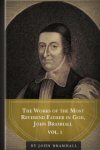
This volume contains a brief biography of John Bramhall and a sermon preached at his death, along with a collection of his letters and two discourses.
Contents:- Life of Archbishop Bramhall
- Sermons Preached at the Funeral of Archbishop Bramhall
- Letters of Archbishop Bramhall
- Dedicatory Epistle of La Milletière’s Victory of Truth
- Answer to the Epistle of M. de La Milletière
- Just Vindication of the Church of England from the Unjust Aspersion of Criminal Schism
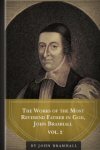
This volume contains three discourses from John Bramhall in defense of the Church of England and responding to his rivals
Contents:- A Replication to the Bishop of Chalcedon’s Survey of the Vindication of the Church of England from Criminous Schism
- A Reply to S. W.’s Refutation of the Bishop of Derry’s Just Vindication of the Church of England
- Schism Guarded and Beaten Back upon the Right Owners
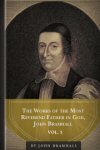
The Works of the Most Reverend Father in God, John Bramhall, vol. 3
- Author: John Bramhall
- Publisher: John Henry Parker
- Publication Date: 1844
- Pages: 628
This volume contains four discourses from John Bramhall in defense of the Church of England and responding to his rivals.
Contents:- The Consecration of Protestant Bishops Vindicated, and the Fable of the Nag’s-Head Ordination Refuted
- A Fair Warning to Take Heed of the Scotch Discipline
- The Serpent-Salve: The Observator’s Grounds Discussed
- Vindication of Himself and the Episcopal Clergy from the Charge of Popery, against Mr. Baxter
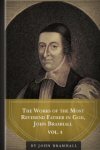
The Works of the Most Reverend Father in God, John Bramhall, vol. 4
- Author: John Bramhall
- Publisher: John Henry Parker
- Publication Date: 1844
- Pages: 616
This volume contains three discourses from John Bramhall in defense of the Church of England and responding to his rivals.
Contents:- Defence of True Liberty from Antecedent and Extrinsecal Necessity, against Mr. Thomas Hobbes
- Castigations of Mr. Thomas Hobbes: His Last Animadversions in the Case Concerning Liberty and Universal Necessity
- The Catching of Leviathan or the Great Whale
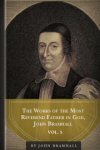
The Works of the Most Reverend Father in God, John Bramhall, vol. 5
- Author: John Bramhall
- Publisher: John Henry Parker
- Publication Date: 1845
- Pages: 510
This volume contains a collection of sermons and shorter discourses from John Bramhall.
Contents:- Discourse of the Sabbath and Lord’s Day
- Sermon on 2 Samuel 10:12
- Sermon on Psalm 126:7
- Sermon on Proverbs 28:13
- Of Persons Dying without Baptism
- An Answer to Two Papers
- An Answer to Objections against Protestants’ Ordination
John Bramhall (1594–1663) was an Anglican theologian and apologist. He was an important defender of the English Church during the English Civil War, frequently addressing Roman Catholic, Puritan, and materialist critics. Born in Yorkshire, he was educated at Sidney Sussex College, Cambridge, eventually earning his Doctor of Divinity there in 1630. In 1633, he joined Thomas Wentworth in Ireland and was archdeacon of Meath, promoting the cause of the Church of England. In 1642, he returned to Yorkshire and preached and wrote in support of Charles I. After the battle of Marston Moor he fled abroad and wrote in defense of the Church as an exile until the Restoration in 1660. He was Archbishop of Armagh in the Church of Ireland from 1660 until his death.